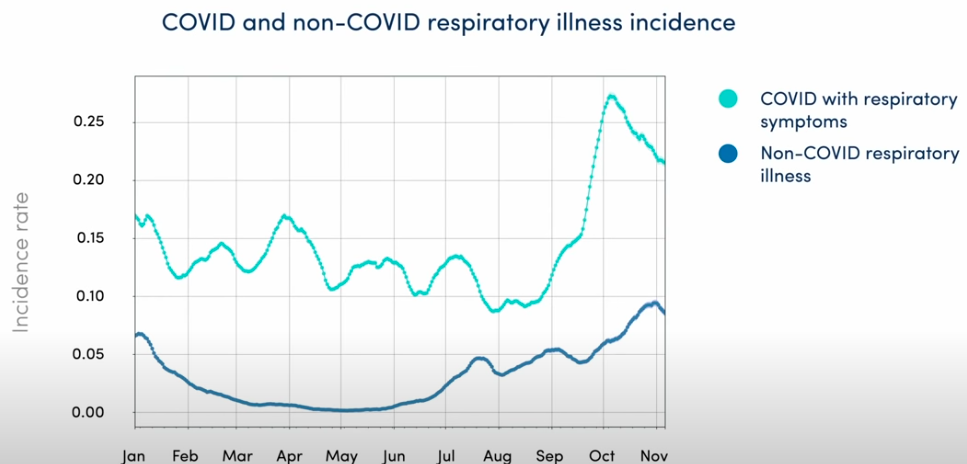COVID symptoms are becoming more “impossible” to tell apart from the common cold, experts warn.
They say the effect is due to vaccinations, which have made the illness milder.

Many symptoms of the disease in people with coronavirus overlap with the common cold.
A runny nose and headaches are frequently seen in people who have Covid, according to the ZOE Covid Symptom Study.
It has found that in October, one in four people with cold-like symptoms tested positive for the disease.
It means many of those who fell sick with the “worst cold ever” may in fact have had Covid.
Experts fear that the public are unaware of how similar coronavirus is to other respiratory illnesses this time of year.
It could mean they don’t get a test, hampering efforts to control the spread.
The NHS continues to say that the three main symptoms of Covid, which warrant a free PCR test, are a fever, persistent cough and loss of smell and taste.
While people still may get these symptoms when sick with Covid, ZOE experts say it is far less likely than it was at the start of the pandemic.
Professor Tim Spector, lead scientist on the study and an epidemiologist at King’s College London, said: “As we head into the colder months, we’re seeing a lot of sickness in the population with widespread outbreaks of colds and still high levels of Covid.
“Knowing the difference between the two is harder than ever, as cases in the vaccinated are mild and include symptoms like sneezing, headache and a runny nose and can be easily transmitted to family members or work colleagues.
“To keep numbers down it’s crucial for everyone eligible to get their booster jabs, even if they have recently had a Covid infection, as we’ve shown natural infections do not always produce an immune response and protection.
“We know from our research that the vaccines (given in 3 doses) provide the greatest possible protection against contracting the virus, and being admitted to hospital with more serious symptoms.”
Experts have long been calling for the official symptom list to be amended amid new evidence, so that less cases are missed.
But the Government has previously said the eligibility for Covid testing needs to be more specific, rather than covering dozens of common symptoms.
What are the most common symptoms?
The most common symptom in people who have had two doses of a vaccine, that report to the ZOE study, are different to that reported on the NHS website.
Positive patients most commonly have a headache and runny nose, reported by 73 per cent.
It’s followed by a sneezing (60 per cent), a sore throat (49 per cent) and persistent cough (49 per cent).
These symptoms were likely to occur alongside others. Having a headache alone, for example, does not necessarily mean you have Covid.
Prof Spector said: “With Covid so high, a lot of you are wondering how you can tell your chances of having Covid if you develop these cold-like symptoms, which we’ve been reporting for months really are impossible to tell the difference from a normal virus.”
The study has been tracking both Covid and other respiratory illnesses to give a rough indication of how likely it is that a “cold” is actually Covid.
Prof Spector said: “Overall one in four of those who had cold symptoms in the month of October had proven Covid in our app.
“In October, you had a pretty high chance it was Covid.
“But in June, it was about one in 11. It’s a three-fold difference in just a few months so that’s why it’s important to know baseline levels.”
The Office for National Statistics, another nationwide Covid tracking study, also report that “the most commonly reported symptoms continue to be cough, fatigue and headache”.
Other symptoms which are part of the virus spectrum include nausea, diarrhoea or abdominal pain.

What about flu?
Flu is caused by a different virus than Covid.
But the two share symptoms, which is likely to further confuse people in the coming months.
ZOE says: “Our research shows that loss of smell (anosmia) or loss of taste is still one of the most important predictors of testing positive for COVID-19, so it’s an important symptom to look out for.”
People sick with the flu do not have loss of smell or taste as much as those with Covid.
They often have an achy body and sudden high temperature.
This is seen with Covid too, although perhaps not as commonly, data suggest.
If you feel unwell, some experts say to get a PCR Covid test anyway. You can also take free lateral flow tests at home, which are less accurate.
Dr Philippa Kaye says: “It is vital that if you have any of these symptoms, even if you are sure it might be a cold, that you must immediately book and get a PCR test done.”






